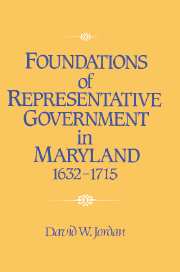Book contents
- Frontmatter
- Contents
- Acknowledgments
- Introduction: “For the Good and Happy Government” of Maryland
- Part I “In the Infancy of This Plantation”: 1632–1660
- Part II “Lord Baltimore's Politick Maximes”: 1660–1689
- Part III “Wee Your Majesties Most Humble and Loyall Subjects”: 1689–1715
- Epilogue: “Our Present Happy Protestant Constitution”
- Appendixes
- A Note on the Sources
- Index
Introduction: “For the Good and Happy Government” of Maryland
Published online by Cambridge University Press: 14 September 2009
- Frontmatter
- Contents
- Acknowledgments
- Introduction: “For the Good and Happy Government” of Maryland
- Part I “In the Infancy of This Plantation”: 1632–1660
- Part II “Lord Baltimore's Politick Maximes”: 1660–1689
- Part III “Wee Your Majesties Most Humble and Loyall Subjects”: 1689–1715
- Epilogue: “Our Present Happy Protestant Constitution”
- Appendixes
- A Note on the Sources
- Index
Summary
On June 20, 1632, Cecilius Calvert, the twenty-seven-year-old second Lord Baltimore, received a proprietary charter for the vast domain in the New World that his father George Calvert had persistently sought for many years. King Charles granted to the Calverts and their heirs a princely territory of more than 10 million acres, to be called “Mariland” in honor of the queen, Henrietta Maria. Although the charter bestowed extensive prerogatives, Calvert's extraordinary dominion was not totally unchecked. Recognizing the growing expectations of the English to have an active voice in their own governance, the document also extended to the settlers of Maryland a critical responsibility “for the good and happy Government of the said Province.” Lord Baltimore's power to “ordain, Make and Enact Laws, of what kind soever, according to their sound discretions, whether relating to the Public State of the said Province, or the private Utility of Individuals” required “the Advice, Assent, and Approbation of the Free-Men of the same Province, or the greater part of them, or of their Delegates or Deputies whom We will shall be called Together for the Framing of Laws.” Representative government in Maryland owes its origin and legitimacy to this clause of the Calverts' charter which made their province the first permanent English colony on the North American continent to provide from its founding for an assembly of resident freemen.
The Lords Baltimore welcomed the existence of an assembly in their colony.
- Type
- Chapter
- Information
- Publisher: Cambridge University PressPrint publication year: 1988



